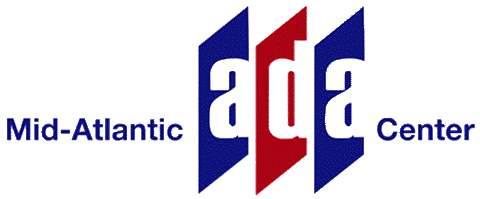(Printer-friendly PDF version | 296 KB)
(Large Print PDF version | 97 KB)
(Versión en español)
TITLE III of the Americans with Disabilities Act (ADA) makes it illegal for any business, building or other place that is open to the public to discriminate against people with disabilities. Such places are called “public accommodations” and include restaurants, hotels, theaters, doctors' offices, pharmacies, retail stores, museums, libraries, parks, private schools, and day care centers.
In order to provide equal access, a public accommodation must provide auxiliary aids and services for people who are deaf or hard of hearing when needed. Examples of auxiliary aids and services include qualified interpreters, note takers, and written materials. The type of auxiliary aid or service provided will depend on what is needed for a specific situation.
EXAMPLES OF EFFECTIVE COMMUNICATION
1. H, a person who is deaf, mainly uses sign language to communicate. H stops by a new car showroom to look at the latest models. The car dealer would be able to communicate general information about the cars using brochures, exchanging notes by pen and notepad, or taking turns at a computer terminal keyboard. If H becomes serious about making a purchase, a qualified interpreter may be necessary because buying a car is a complicated process.
2. H goes to his doctor for regular blood pressure and weight check-ups with the nurse. Exchanging notes and using gestures are likely all that is needed for this type of check-up. When H has a mild stroke and returns to his doctor for a full exam and tests, he asks for a sign-language interpreter. The doctor should arrange for a qualified interpreter because this type of visit is more complicated.
HOW DO YOU FIND AN INTERPRETER?
The National Registry of Interpreters for the Deaf (RID) hosts an online database or call 703.838.0030 (voice) or 703.838.0459 (TTY). You can also seek referrals from your state office for the Deaf and Hard of Hearing, local chapter of the National Association of the Deaf, or from the person requesting the interpreter. Start looking for an interpreter as soon as the need arises. It can be hard to find a qualified interpreter on short notice.
TAX CREDITS
Small businesses can get tax credits for the expense of an interpreter. A small business is one with 30 or fewer employees OR with $1 million or less in gross receipts for the preceding tax year.
SURCHARGES
Although a sign language interpreter is an extra expense, the business cannot charge this cost to the person who needs the interpreter.
QUALIFIED INTERPRETERS
- A qualified interpreter is one "who is able to interpret effectively, accurately and impartially, both receptively and expressively, using any necessary specialized vocabulary." An individual does not have to be certified in order to meet this standard. A certified interpreter may not meet this standard in all situations, e.g., where the interpreter is not familiar with the specialized vocabulary involved in the communication at Be aware that State laws may require certified interpreters, superseding the ADA. Be sure to check local laws.
- There are a number of different sign language systems. The most common systems are American Sign Language and signed People who use a particular system may not communicate well through an interpreter who uses a different system.
- Family members are not considered appropriate interpreters because of their emotional or personal involvement and because it would be difficult to maintain
LIMITATIONS
A public accommodation does not have to provide any auxiliary aid or service if doing so would either fundamentally change the nature of the goods or services offered or result in an undue burden. "Undue burden" is defined as "significant difficulty or expense."
FOR MORE INFORMATION
► ADA National Network: Free technical assistance: (800) 949-4232 V/TTY. adata.org
|
Content was developed by the Mid-Atlantic ADA Center, and is based on professional consensus of ADA experts and the ADA National Network. |
|
|
TransCen, Inc. |
The contents of this factsheet were developed under grants from the National Institute on Disability, Independent Living, and Rehabilitation Research (NIDILRR grant numbers 90DP0089 and 90DP0086). NIDILRR is a Center within the Administration for Community Living (ACL), Department of Health and Human Services (HHS). The contents of this factsheet do not necessarily represent the policy of NIDILRR, ACL, HHS, and you should not assume endorsement by the Federal Government. |
|
© Copyright 2017 ADA National Network. All Rights Reserved. |
|

.png)





